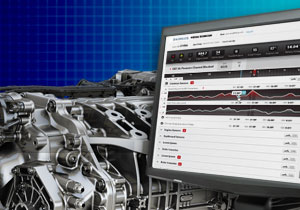Testing & Validating Products in the Engineering Lab
 As Senior Manager of the Detroit Powertrain Test Center, I know how important of a role testing plays in the overall design and production of Detroit products. Our Engineering Lab, referred to internally as the E4 Lab, is where most of the testing of engines, aftertreatment devices and other powertrain components is completed before they go into production. This can be a completely new project or a redesign of an existing product. The Engineering Lab, together with the Pilot Center (where real world testing takes place), makes up what we call the Detroit Powertrain Test Center.
As Senior Manager of the Detroit Powertrain Test Center, I know how important of a role testing plays in the overall design and production of Detroit products. Our Engineering Lab, referred to internally as the E4 Lab, is where most of the testing of engines, aftertreatment devices and other powertrain components is completed before they go into production. This can be a completely new project or a redesign of an existing product. The Engineering Lab, together with the Pilot Center (where real world testing takes place), makes up what we call the Detroit Powertrain Test Center.
The Engineering Lab is broken up into different sections. In the Assembly Room, our team builds test engines, measures and puts instrumentation on parts, and whatever else is required by engineering to prepare for testing.
From Assembly, the test engines and other powertrain components are then distributed to other sections of the lab. In Durability Testing, machines run a prescribed cycle based on the engineering request. There are several different core testing cycles to choose from, depending on particular engineering needs. These tests are quite rigorous, mostly performing 1,000-2,000 hours under severe conditions to ensure maximum reliability and robustness. If a component fails during a test, the system is updated to reflect the failure and sent to engineering to correct the action.
A slightly more specialized section of the lab is Functional Testing. Basically, you could think of this as a custom test. For example, if field tests are indicating an emerging concern, engineers can design a functional test that ultimately leads to a design change to correct the issue. Functional Testing can also be useful with brand new projects. For example, Detroit recently released a variable speed water pump. To ensure robustness, our lab ran specific functional tests to find any issues before sending this product into production.
Performance Testing is where the engine software and calibration development takes place and emission regulations are fulfilled. On Board Diagnostics (OBD) tests are run to detect engine or aftertreatment system failures. The OBD settings are based on government regulations for allowable emissions if an emission control device is not working properly. The performance and aftertreatment testing teams also work to develop and enhance fuel efficiency of the Detroit products. Detroit has certification capable test cells meeting specific government requirements. This is crucial because the specific boundary conditions in test cells have to be met to generate engine and aftertreatment data proving compliance prior to all product releases.
The engineering lab also contains a Component Test Area where we run specific component test cycles. Here we can evaluate engine and aftertreatment systems on a test fixture that simulate real world applications. With a turbo wastegate actuator, for instance, we can apply heat and vibration and run cycles much faster than you would in durability or field testing in order to validate the product.
Testing quality would not be possible in the durability, performance and component testing areas without the support of our facilities, emissions and instrumentation groups. These groups are responsible for the setup, preventative maintenance and calibration of all measurement systems.
Finally, it is worth noting that the Engineering Lab does a lot of durability and performance testing, especially of engine and aftertreatment systems, for the European market.